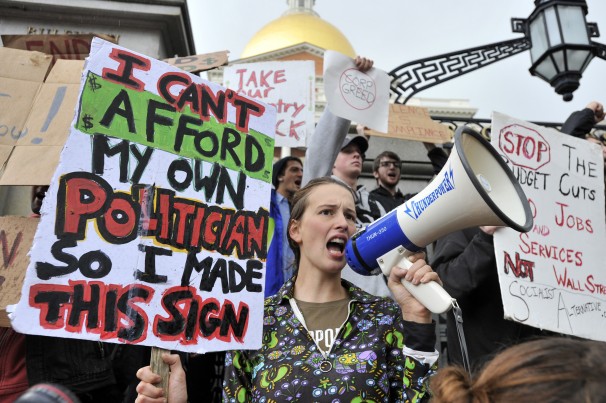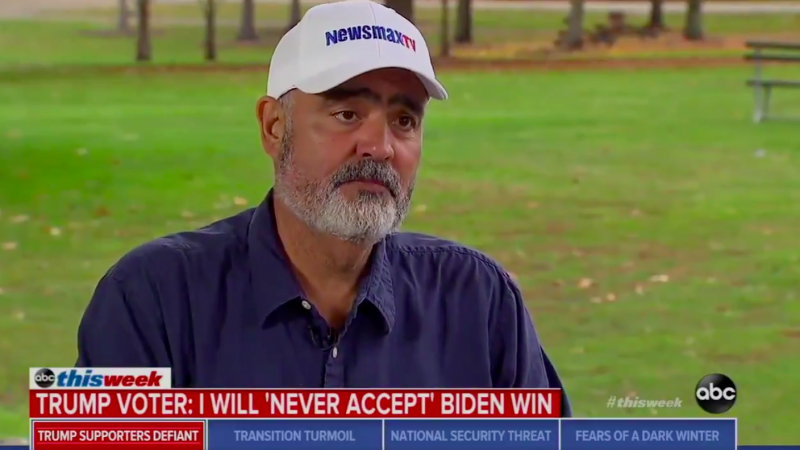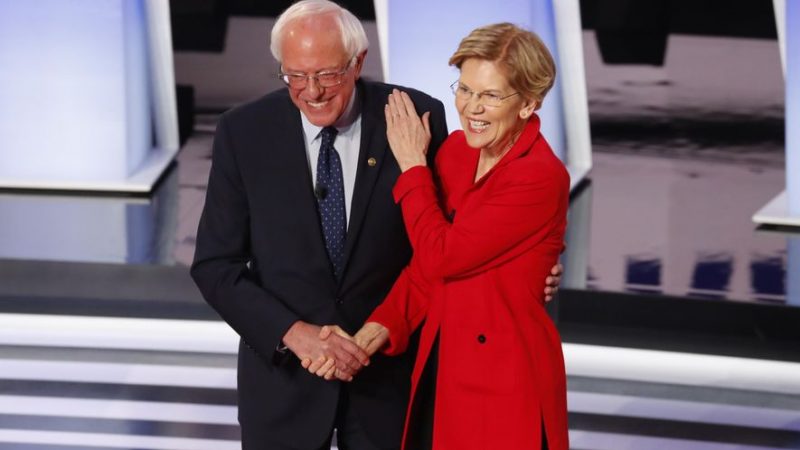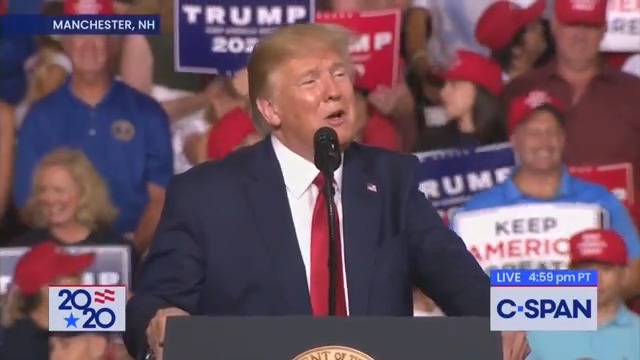On Third Parties, It’s The Ideas That Matter—Not The Candidate

Criticisms of the other players in this election are beginning to coalesce into Election 2016’s grand finale. After a year and a half of talking shit, we’ll be faced with the actual task of voting. Or not.
I’m not so much an undecided voter myself as I am undecided on whether or not I’ll vote at all. My post-election plans, no matter who wins, will not change. I’ll still be out organizing for the same things.
I’ll be doing this because Democratic and Republican policy, while not literally identical, intersect in a lot of troubling places, such as domestic spying, drone wars, mass incarceration, free trade, prosecuting whistleblowers (yeah, I wouldn’t put too much stock into any #FreeJulian stuff coming out of the Trump circus), police militarization, labor and activist suppression, close ties with Wall Street, the environment and bullshit health care policies.
A Clinton or Trump presidency will have no effect on my continued efforts to work with Palestinian refugees in my hometown, or help to build a Black Lives Matter presence there, or increase my involvement with the anti-fracking movement in upstate New York. From Ban the Box to the Fight for $15, these things will all continue to be relevant for me either way.
And this is where the criticism of third party candidates like Jill Stein miss the forest for the trees. I’m one of many Americans who aren’t looking for someone else to save America. As a beleaguered revolutionary once said, “The people liberate themselves.”
I voted Green in 2012. I voted for Nader in 2008. I voted for Roger Calero in 2004. Of course I didn’t expect any of them to win—that wasn’t the point. I supported the ideas they stood for, and wanted those ideas to persist. And for as much of a rough ride as Greens and leftists gave Bernie Sanders, he sort of did what many of us seek to do in consistently voting for third-parties and promoting outside-the-two-party-box ideas. The operative phrase here is “sort of,” as Bernie wants Scandinavia, not revolution (so please stop saying the latter).
Sure, Bernie could have gone further with his ideas, but he did inspire roughly half of the Democratic Party to care about the things that Democrats used to care about, like income inequality and the preservation of the middle class.
And this is where voting third party, especially in a place like New York, which will undoubtedly vote blue, is more than just voting for a single individual. Somebody has to run, but it’s not as if Gary Johnson or Jill Stein crafted the platforms of their respective parties. Those ideas existed before them and will exist for many years after Libertarians and Greens move on.
Over the weekend, Last Week Tonight’s John Oliver gave both candidates the LWT treatment, and while it was funny, it did miss the overall point. As Oliver introduced Johnson, he noted that the Libertarian nominee was anti-war, for the legalization of marijuana, and against the drug war. These are things that both he and the Libertarian Party have in common with Stein and the Green Party. Oliver also mentioned how Jill Stein was in favor of environmental protection, expanding LGBT rights and reducing income inequality. Those sound like things Democrats say, yes, but the Greens actually mean it.
And, look, the prospect of a Trump presidency certainly isn’t ideal. His campaign has produced a very menacing tide of fascism throughout the United States, and the idea of his presidency being a conduit for policy influenced by frightened white people would cause a lot of trouble for many Americans. That said, a Clinton presidency would be a continuation of Barack Obama’s presidency, which isn’t something to be proud of.
Obama’s record has been troubling for many reasons, ranging from the TPP, to the declining state of labor unions, to backing Israeli aggression in Palestine, to the administration’s war on whistleblowers, to its soft approach regarding Wall Street following the recession, and even its record on civil rights, which arguably could have left activists better off under a Republican administration. For leftists who have long been critical of the Democratic Party, Clinton promises more weariness.
When the UN inquired about human rights abuses in the US during the 2011 Occupy protests, the US State Department (at the time under Hillary Clinton) never responded. And as the Global Justice Clinic of the NYU School of Law and the Walter Leitner International Human Rights Clinic at the Leitner Center for International Law and Justice (Fordham Law School) compiled in their report on the matter, these were serious allegations, as the report’s executive summary states:
“This report follows a review of thousands of news reports and hundreds of hours of video, extensive firsthand observation, and detailed witness interviews. In New York City, some of the worst practices documented include:
• Aggressive, unnecessary and excessive police force against peaceful protesters,
bystanders, legal observers, and journalists
• Obstruction of press freedoms and independent legal monitoring
• Pervasive surveillance of peaceful political activity
• Violent late-night raids on peaceful encampments
• Unjustified closure of public space, dispersal of peaceful assemblies, and kettling
(corralling and trapping) of protesters
• Arbitrary and selective rule enforcement and baseless arrests
• Failures to ensure transparency about applicable government policies
• Failures to ensure accountability for those allegedly responsible for abuses
These practices violate assembly and expression rights and breach the U.S. government’s international legal obligations to respect those rights. In New York City, protest policing concerns are extensive and exist against a backdrop of disproportionate and well-documented abusive policing practices in poor and minority communities outside of the protest context.
Governments—including U.S. federal, state, and local authorities—are obliged by international law to uphold the rights of individuals to peacefully assemble and to seek to reform their governments. The freedoms of assembly and expression are essential pillars for democratic participation, the exchange and development of grievances and reforms, and securing positive social change. This report provides extensive analysis of the U.S. government’s international legal obligations with respect to protests. The abusive practices documented in this report violate international law and suppress and chill protest rights, not only by undermining individual liberty, but also by causing both minor and serious physical injuries, inhibiting collective debate and the capacity to effectively press for social and economic change, and making people afraid to attend otherwise peaceful assemblies.”
So, when the prospect of voting third party comes up, there might be more to it than merely being sick of Clinton or Trump. Both major party nominees have earned their reputations as the least-liked candidates in seven decades, and their nominations are indicative of America’s bi-party, lowest common denominator, lesser-of-two-evils voting strategy. And they didn’t exactly get where they are without help from voters plagued with limited imagination due to our two-party system’s aversion to real democracy.
The bottom line is that there are ideas which deserve dialogue. There are useful debates to be had over ending the drug war and mass incarceration, as opposed to private email servers and Obama citizenship. Getting the state out of people’s bedrooms and away from women’s vaginas, ending police militarization, and developing much more ethically and environmentally sound economic practices are more important debates as well. The debate over how to mitigate the influence of the financial industry on political decisions, and how to instill justice in the justice system are the real debates worth having.
So vote for whomever you want, but remember that it’s the policy and ideas which are promoted and represented that matter. The individual person matters less than his or her ideas.






